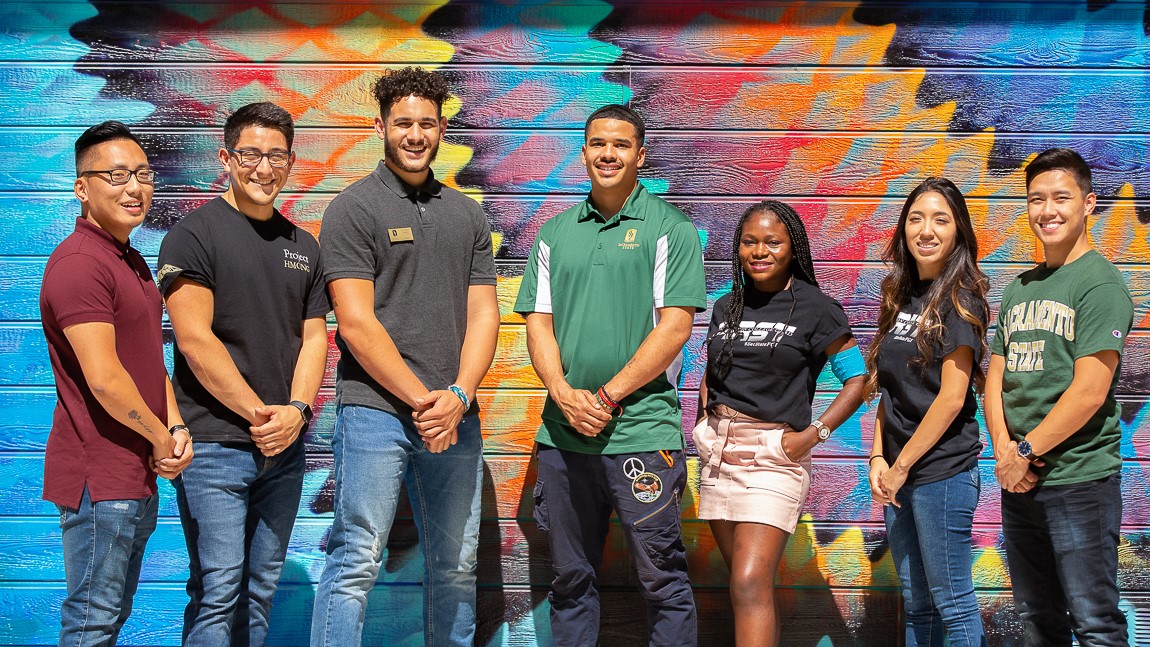
A new center for first-generation students will provide support and resources for students taking a major educational step. (Sacramento State photo)
By Cynthia Hubert
Sylvia Hernandez’s father was a migrant worker who toiled sunup to sundown in Northern California's agricultural fields, even on the hottest summer days. Growing up, she dreamed of a better future for herself.
But Hernandez had no role models to help her navigate college. Her parents, though supportive, had neither the finances nor the knowledge to steer her forward.
She found her lifeline at Sacramento State, where she and other “first-generation” students have access to a variety of programs that place them on a path toward success.
“If not for Sac State and all of the help I received, I would have been lost,” said Hernandez, a senior who is on pace to graduate with a Social Work degree in May 2021.
Soon, the services and programs designed to help her and others like her will be consolidated in the University’s new Center for First-Generation Student Initiatives. The center, to be in Lassen Hall, will formally open with a virtual ceremony in September.
More than a third of Sac State students identify as first generation, meaning that neither of their parents graduated college.
The new center will bring together faculty, staff, students and alumni to support scholars through a variety of programs, workshops and other resources designed to help them succeed in college and prepare for careers, said Chao Vang, of Sac State’s Student Academic Success and Educational Equity Programs.
Many students who are the first in their families to attend college face significant barriers, Vang said, including a lack of knowledge about enrolling in courses and navigating campus. Some feel pressure from relatives who may rely on them to act as translators and otherwise help their families.
“If we are able to support this group, they will have an impact and move the needle” toward improving the University’s four-year graduation rate, Vang said.
Last year, thanks to the University’s “Finish in Four” push, 20.4 percent of Sac State graduates completed their coursework in four years, up from 8.8 percent in 2016. The 127 percent improvement is the largest among CSU’s 23 campuses, according to James Dragna, Sac State’s graduation czar.
The center will offer students group activities and individual support to help them persist and succeed, Vang said. It also will create a coalition of campus advocates to promote and celebrate “the sense of pride and strength” associated with being a first-generation college student, he said.
Sac State recently was honored as a “First Forward” institution, a national recognition program for colleges committed to first-gen students, and created a chapter of Tri-Alpha, a national honor society that recognizes their academic accomplishments. The University also has a First Generation Institute, a student-centered program designed to promote retention and graduation rates.
The new center will serve as an umbrella for these programs and more.
“As first-generation students, we can’t just ask our families questions about financial aid or enrolling in classes or anything else about college, because likely, they won’t know the answers,” Hernandez said. The center will be “a place that we can call home.”
Andrew Yang, a first-generation Hornet who is set to graduate in fall 2020 with a degree in Recreation, Parks, and Tourism Administration, agreed.
“It will give first-gen students a sense of community,” Yang said. “It will let them know that they are not alone, that there are lots of other students like them, and there are first-generation students who have become professionals.
"Once students are exposed to those things, they’ll feel more comfortable” pursuing their academic degrees, he said.
In Yang’s Hmong culture, young men traditionally are expected to have children early and help provide for their extended families, he said. In part because he grew up in a Sacramento neighborhood plagued by violence and gangs, his parents encouraged him to go to college. But they were unable to help him with the sometimes-complex processes of enrolling, pursuing financial help and managing time.
He was able to adapt, thanks to resources such as Sac State’s Educational Opportunity Program, which offers admissions help and academic and financial aid assistance, among other services.
Ed Mills, Sac State’s vice president for Student Affairs, was a first-generation student and remembers the difficult transition to college life. The Center for First-Gen Initiatives, he said, will smooth the path for future scholars.
“Sacramento State supports nearly 10,000 first-generation students at any given moment,” Mills said. “It’s incredibly important for us to provide services, support and engagement opportunities to help our students with things most people in higher education take for granted.”
